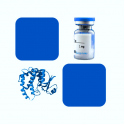
- Remove this product from my favorite's list.
- Add this product to my list of favorites.
Products
Newsletter
 |  |  |  |  |  |

Background
As a transmembrane receptor, the prolactin receptor (PRL-R) interacts with prolactin. In addition, the PRL-R also binds and is activated by growth hormone (GH) and human placental lactogen (hPL). Preclinical investigations, epidemiological studies and analyses of tissue specimens from patients strongly support the contribution of prolactin receptor (PRLR) signaling to breast and prostate tumorigenesis and cancer progression. Moreover, The PRLR has been found to be essential for lobuloalveolar maturation of the mammary glands during pregnancy, as evidenced by the fact that PRLR knockout mice show severely impaired development of lobuloalveolar structures.
Source
Recombinant Human Prolactin R, Fc Tag (PRP-H5251) is expressed from human 293 cells (HEK293). It contains AA Gln 25 - Asp 234 (Accession # P16471-1).
Predicted N-terminus: Gln 25
Molecular Characterization
This protein carries a human IgG1 Fc tag at the C-terminus.
The protein has a calculated MW of 51.0 kDa. The protein migrates as 64 kDa under reducing (R) condition (SDS-PAGE) due to glycosylation.
Endotoxin
Less than 1.0 EU per μg by the LAL method.
Purity
>95% as determined by SDS-PAGE.
Formulation
Lyophilized from 0.22 μm filtered solution in Tris with Glycine, Arginine and NaCl, pH7.5 with trehalose as protectant.
Reconstitution
Please see Certificate of Analysis for specific instructions.
For best performance, we strongly recommend you to follow the reconstitution protocol provided in the CoA.
Storage
For long term storage, the product should be stored at lyophilized state at -20°C or lower.
Please avoid repeated freeze-thaw cycles.
This product is stable after storage at:
-20°C to -70°C for 12 months in lyophilized state;
-70°C for 3 months under sterile conditions after reconstitution.
Bioactivity
Please refer to product data sheet.
(1) Connecting Bisphenol A Exposure to PCOS: Findings from a Case-Control Investigation"
Patel, Chaudhary, Panchal et al
Reprod Sci (2024)
(2) "Gender Differences in Patients with Prolactinoma: Single-center Ukrainian Experience"
Voznyak, Zinkevych, Lytvynenko et al
Rev Recent Clin Trials (2024)
(3) "Reliability of udder infrared thermography as a non-invasive technology for early detection of sub-clinical mastitis in Sahiwal (Bos indicus) cows under semi-intensive production system"
Satheesan, Kittur, Alhussien et al
J Therm Biol (2024) 121, 103838
Showing 1-3 of 2602 papers.
Follow us